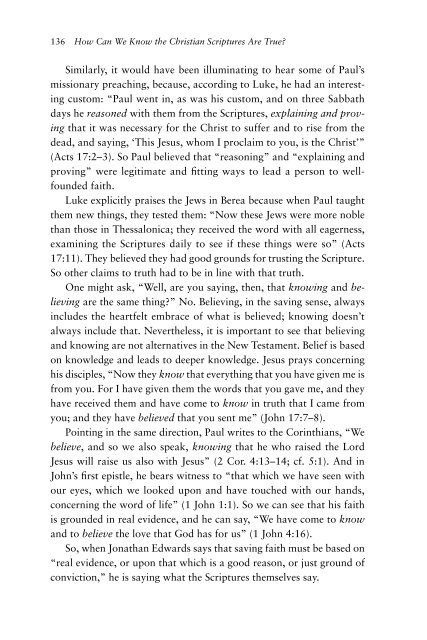Scriptures selfattesting authority question doctrine truthfulness Scriptures
peculiar-glory-en
peculiar-glory-en
Create successful ePaper yourself
Turn your PDF publications into a flip-book with our unique Google optimized e-Paper software.
136 How Can We Know the Christian <strong>Scriptures</strong> Are True?<br />
Similarly, it would have been illuminating to hear some of Paul’s<br />
missionary preaching, because, according to Luke, he had an interesting<br />
custom: “Paul went in, as was his custom, and on three Sabbath<br />
days he reasoned with them from the <strong>Scriptures</strong>, explaining and proving<br />
that it was necessary for the Christ to suffer and to rise from the<br />
dead, and saying, ‘This Jesus, whom I proclaim to you, is the Christ’”<br />
(Acts 17:2–3). So Paul believed that “reasoning” and “explaining and<br />
proving” were legitimate and fitting ways to lead a person to wellfounded<br />
faith.<br />
Luke explicitly praises the Jews in Berea because when Paul taught<br />
them new things, they tested them: “Now these Jews were more noble<br />
than those in Thessalonica; they received the word with all eagerness,<br />
examining the <strong>Scriptures</strong> daily to see if these things were so” (Acts<br />
17:11). They believed they had good grounds for trusting the Scripture.<br />
So other claims to truth had to be in line with that truth.<br />
One might ask, “Well, are you saying, then, that knowing and believing<br />
are the same thing?” No. Believing, in the saving sense, always<br />
includes the heartfelt embrace of what is believed; knowing doesn’t<br />
always include that. Nevertheless, it is important to see that believing<br />
and knowing are not alternatives in the New Testament. Belief is based<br />
on knowledge and leads to deeper knowledge. Jesus prays concerning<br />
his disciples, “Now they know that everything that you have given me is<br />
from you. For I have given them the words that you gave me, and they<br />
have received them and have come to know in truth that I came from<br />
you; and they have believed that you sent me” (John 17:7–8).<br />
Pointing in the same direction, Paul writes to the Corinthians, “We<br />
believe, and so we also speak, knowing that he who raised the Lord<br />
Jesus will raise us also with Jesus” (2 Cor. 4:13–14; cf. 5:1). And in<br />
John’s first epistle, he bears witness to “that which we have seen with<br />
our eyes, which we looked upon and have touched with our hands,<br />
concerning the word of life” (1 John 1:1). So we can see that his faith<br />
is grounded in real evidence, and he can say, “We have come to know<br />
and to believe the love that God has for us” (1 John 4:16).<br />
So, when Jonathan Edwards says that saving faith must be based on<br />
“real evidence, or upon that which is a good reason, or just ground of<br />
conviction,” he is saying what the <strong>Scriptures</strong> themselves say.


